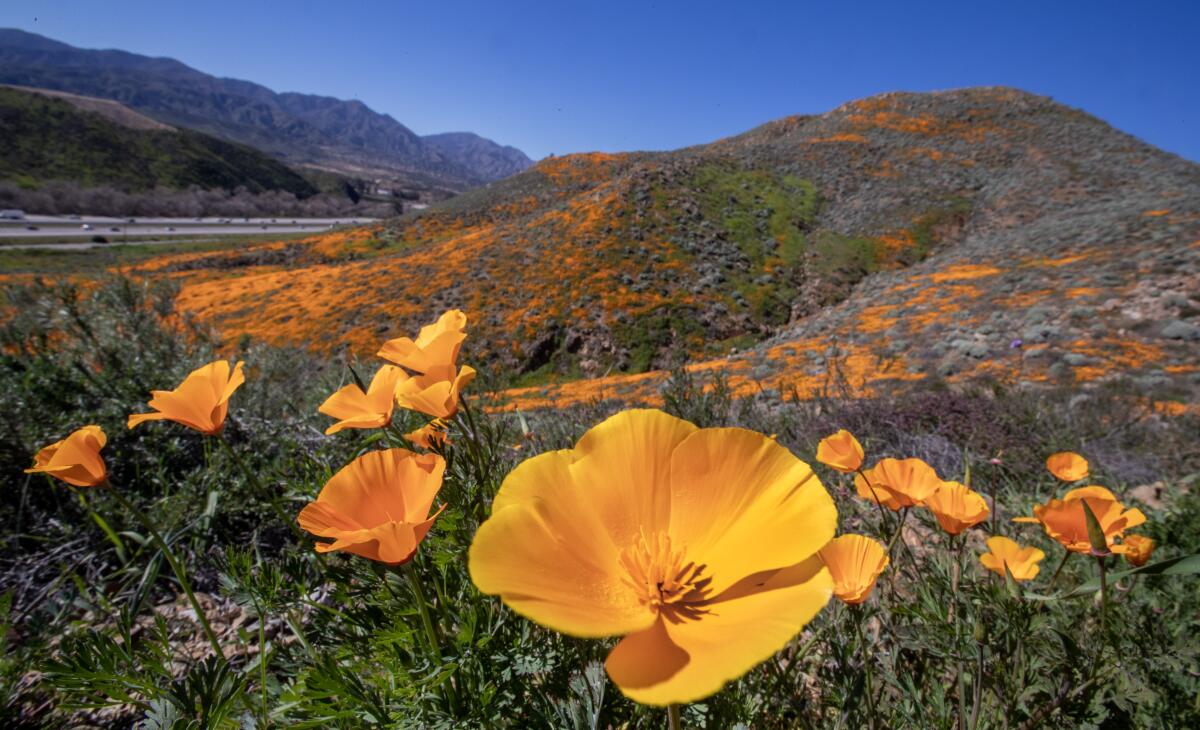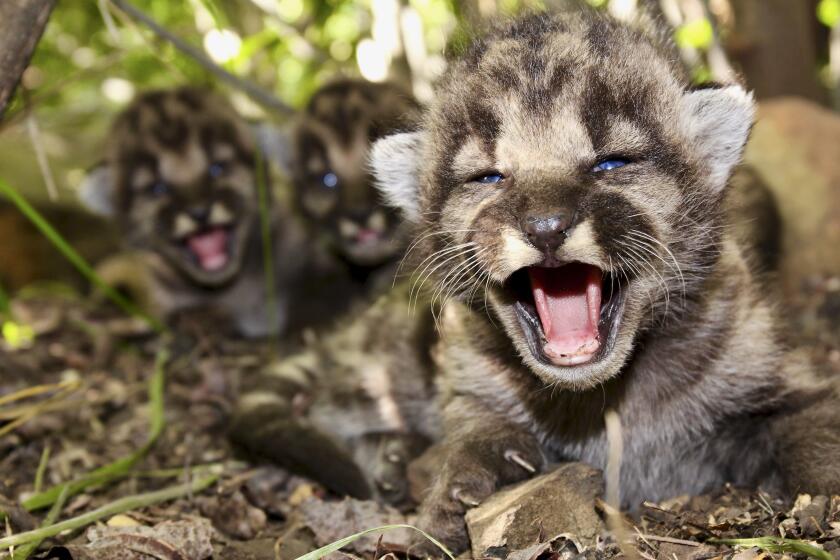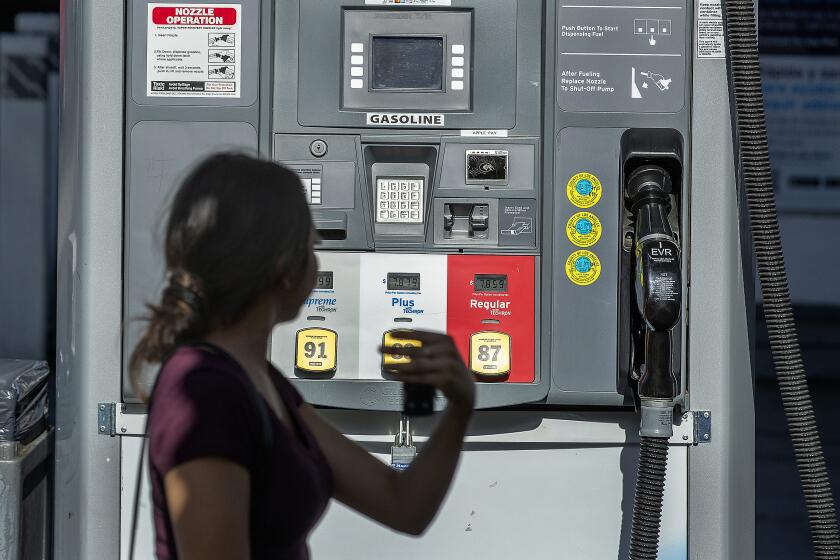Commentary: Why close the ‘super bloom’? Because we can’t seem to love nature without trampling it

- Share via
I had mixed feelings when I heard that officials in Riverside County were closing hiking trails and parking areas to keep visitors from trampling a spectacular bloom of wildflowers along Interstate 15 in Lake Elsinore.
It’s too bad something as beautiful and quintessentially Californian as hillsides blanketed with orange poppies is being closed to the public with no-parking signs, law enforcement patrols and threats of citation, towing or arrest. But I have to admit I was also relieved that this landscape, stressed by years of drought, won’t emerge from a sorely needed series of winter storms only to be crushed by sightseers. That maybe this time, Californians won’t collectively harm something we all love.
Authorities are trying to avoid a repeat of 2019, when the last “super bloom” in the Walker Canyon area attracted heavy crowds and traffic congestion from hundreds of thousands of visitors, some of them tramping on the flowers to get the perfect photo and haphazardly parking their cars, even on the shoulder of the freeway.
A new study underlines just how dangerous it is for California’s mountain lions. We need to build more road crossings and lessen our use of rodenticides if we want to keep them among us.
I understand the impulse to see such a stunning burst of beauty firsthand. And Californians have a right to enjoy these open spaces. But not at the expense of the environment and public safety. Why can’t we appreciate natural beauty without destroying it?
It’s not an isolated example of self-centered behavior spoiling one of California’s natural wonders.
Last year, authorities at Redwood National Park had to urge visitors to stay away from Hyperion, the world’s tallest tree, or risk a $5,000 fine and six months in jail, after its off-trail location — which had been kept secret to protect it — was being “discovered” by a growing number of travel bloggers and thrill-seekers. They were damaging the forest by bushwhacking to reach the 380-foot tree, trampling the vegetation around its base and even trying to climb it.
When officials announced last week that public access to the Walker Canyon wildflowers would be cut off entirely, Riverside County Sheriff Chad Bianco warned that there would be zero tolerance for parking violations, going so far as to say that scofflaws could be arrested and booked into jail.
As an environmental reporter, I write about how climate change is hurting people and the planet. But at home, I’ve struggled to talk about it with my own daughters.
Officials told me this week that people have mostly stayed away, though some are still pulling over on the side of the freeway and a few have tried to sneak in. They’ve issued some parking tickets and towed some vehicles, but there have been no arrests and “most people follow the rules and respect the closures,” Riverside County Sheriff’s Sgt. Deirdre Vickers said Tuesday.
It would be better if officials weren’t resorting to such heavy-handed measures. Isn’t there some way to control crowds and allow for limited public access without depriving everyone? Like a timed-entry lottery system or a designated area for people to safely view flowers? The city isn’t offering a shuttle service to Walker Canyon it used four years ago, and seems to think nothing short of a total closure will stem the misbehavior.
“Because even if we do have the viewing area, people don’t listen,” said Jovanny Rivera Huerta, a city of Lake Elsinore spokesperson.
Many of us have been starved for time outdoors after years of pandemic isolation. Nature is good for the body and soul, and it’s understandable that we’d want to pull over to gaze at the colorful hillsides and post some pictures on social media. But we also need to consider our collective impact and resist the urge to flock to these fragile landscapes and risk ruining them for everyone.
Big Oil is posting record profits. It’s time for California lawmakers to get moving and advance legislation to curb excessive refinery profits and prevent oil companies from ripping people off while they pollute the planet.
In California, nature and crowds often uncomfortably converge. We endure hours of traffic to see Yosemite’s waterfalls, visit the beach on summer days and play in the snow in the San Gabriel and San Bernardino mountains. To get there, most of us burn gasoline, spewing greenhouse gas pollution that is heating the planet and threatening those same ecosystems.
Situations like the Hyperion tree and Walker Canyon wildflowers are fueled, at least in part, by social media and people’s desire to experience and document the superlative of everything: the best food, the tallest tree, the most elusive landmark, the biggest bloom. News coverage doesn’t exactly help by calling attention to the “super bloom” and reinforcing the hype, only to cover the mayhem that ensues when people go to see it for themselves.
One of the best things about California is that so much of its natural beauty — the coast, mountains, hills and desert — is public and belongs to all of us. But with that access comes a duty to protect these landscapes, more than anything, from ourselves.
More to Read
A cure for the common opinion
Get thought-provoking perspectives with our weekly newsletter.
You may occasionally receive promotional content from the Los Angeles Times.














